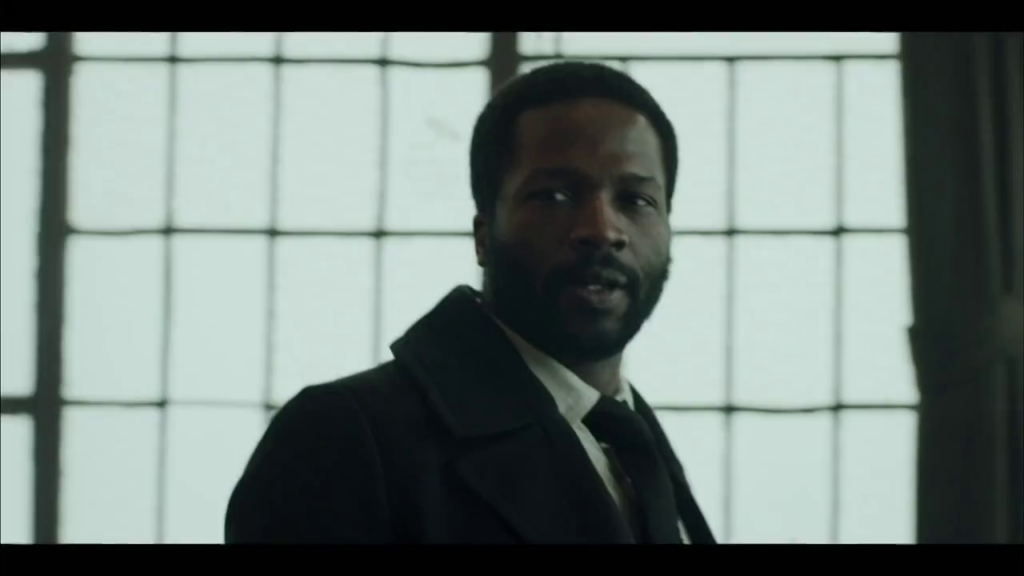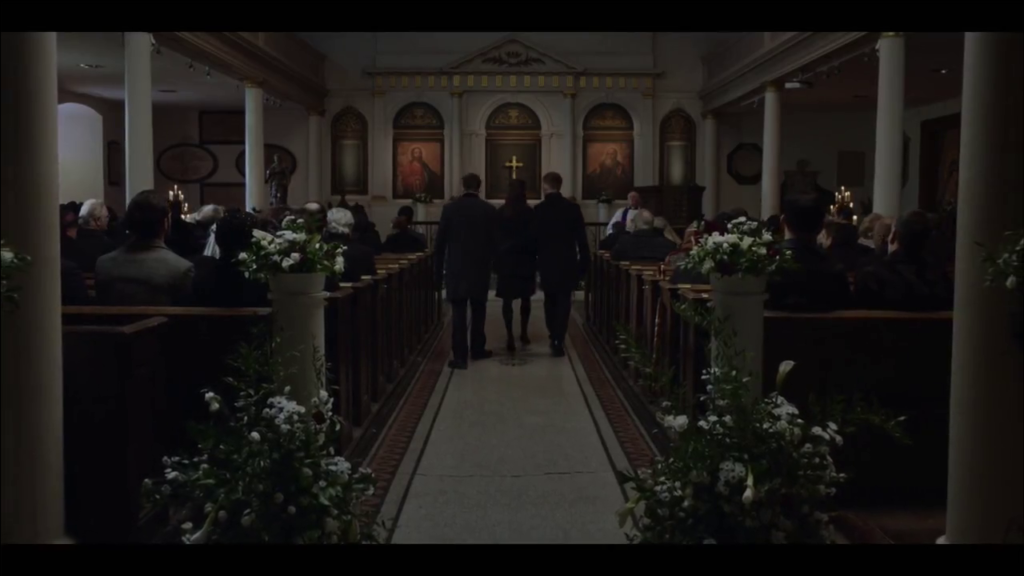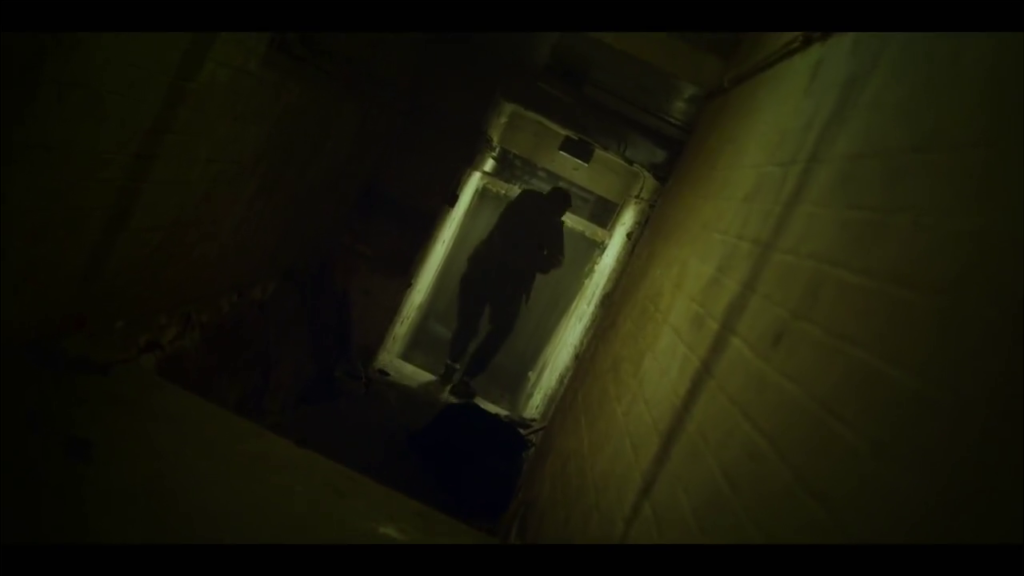Gangs of London
Season 1
Episode 1
London mauling
After Apostle – an offbeat, ambitious stab at a folk horror movie from a writer-director working in his own country and language for the first time in over a decade – released on Netflix in 2018 to solid-but-not-stellar reception, it wasn’t at all clear what Gareth Evans would do next.
If there’s one thing that’s been consistently true of him thus far in his career, it’s that he’s never settled into a comfort zone. One gets the sense that he’s a creatively restless guy, and someone who tends to jump when opportunity knocks, even if it’s an opportunity in an arena where he has no prior experience. Despite having his constellation of recurring collaborators, and recognisable themes and preoccupations that tie his body of work together when viewed through the lens of auteur theory, each successive project that he’s embarked upon has still been a departure from the one before it; a different genre; a different country; a different budget level; a different production pipeline.
As of 2020, we can add to that list: a different medium. Evans and his stalwart editor, Matt Flannery, were approached by Pulse Films producer Thomas Benski with a pitch to create a series of films set in the London underworld, based on a 2006 PSP game. At Evans’s prompting, they opted instead to go for a TV show to more fully explore the ecosystem of criminality he had in mind.
If this felt like a gamble when the idea was conceived – and I suspect it must have – then it’s a gamble that paid off in spades. Gangs of London was a huge hit. The show became the second-biggest original drama in the history of TV channel Sky Atlantic, beaten only by the breakout phenomenon that was 2019’s Chernobyl. It’s become the jewel in the crown of Pulse Films. It was nominated for “Best Drama Series” at the 2021 BAFTAs, and won “Best Editing” and “Best Sound” at the BAFTA Cymru awards (those are the Welsh BAFTAs, if you’re wondering).

It helps that it arrived at the right time, releasing just after the start of the COVID pandemic, when audiences were hungry for a meaty, gripping binge-watch. In an early 2021 interview with the cast, facilitator Jacqueline Coley characterises the show as having been essential quarantine viewing for the UK, in the same way that Tiger King was for the US, when its 9-episode first season went out as a binge-worthy block on April 23, 2020.
(I can actually attest to this, somewhat. In the spring of 2020, during the first lockdown in Scotland, I watched Gangs of London while sequestered at my childhood home with my parents. Obviously, being a Gareth Evans joint, I would have watched it regardless of its popularity, but it even ended up being something of a bonding experience with my Dad.)
The story of Gangs of London concerns the Wallace dynasty, a family of modern-day gangsters who stand at the top of London’s organised crime pecking order. The inciting incident comes when family patriarch Finn Wallace (played by Colm Meaney) is assassinated in a derelict council-estate tower block, leaving behind a power vacuum, with the city’s other criminal enterprises scrambling to consolidate their positions after the period of stability they enjoyed under Finn. Not helping matters is Sean Wallace, Finn’s son (played by Joe Cole, fresh off his stint in another celebrated gangster drama, Peaky Blinders). Sean, the heir apparent to the Wallace business and consumed with the need for revenge, overrides the advice of his lieutenants and shuts down all of his family’s operations until his father’s killer is identified. This, naturally, immediately makes him enemies among the various client gangs, who depend on the Wallace organisation’s connections for their cash flow.

Further stirring up the mix is deuteragonist Elliot Finch (Ṣọpẹ́ Dìrísù), a low-level enforcer in the Wallace organisation, ex-military, who’s responsible for caring for his ailing, ex-boxer father. In the wake of Finn’s death, he finds an opportunity to ingratiate himself with Sean and rise into the organisation’s inner circle.
That’s a fecund, heady mix of genre tropes, right there. Gangs of London benefits greatly, particularly in this early stretch, from having a straightforward, elemental premise. A gang boss dies, and chaos ensues. That’s not even an elevator pitch; you can communicate the drama of the material before the elevator doors are finished closing. For all that the narrative grows complicated and snarled and twisty as it develops, all of those complications proceed directly and organically from the inciting incident. Who killed Finn Wallace, and why? It’s a strong central question to keep viewers coming back from episode to episode. I’m not the first person to make this comparison, but Gangs of London gets at the same sort of broad, blockbuster appeal as the first season of Game of Thrones, transplanted to a contemporary setting. Like the early episodes of Game of Thrones, it has the spine of a whodunnit, with broad-scope political machinations and power plays organised around that spine.
Gangs of London benefits greatly, particularly in this early stretch, from having a straightforward, elemental premise.
Episode 1,* the bumper-length opening to the series, begins with Finn’s death in the first five minutes, and spends the rest of its runtime establishing the large cast of characters, setting the wheels in motion for the various intrigues and betrayals to follow. What might easily have felt like an hour-and-a-half of place-setting instead becomes an impressively absorbing piece of television, thanks to adroit, economical writing, direction, and editing. The narrative is very effectively organised; it introduces the viewer to the show’s core cast, and the various tensions and dynamics between them, with a series of well-orchestrated interactions, such that it never feels overtly expository.

Most of the first half of the episode is spent in the Wallaces’ London townhouse, and then in and around Finn’s funeral. Moments like the one where Shannon Dumani (Pippa Bennett-Warner) comments on her brother Alex (Paapa Essiedu) discreetly tucking a pistol into his belt when the Kurds arrive; or Marian Wallace (Finn’s widow, played by Game of Thrones alumnus Michelle Fairley) helping her son Billy (Brian Vernel) with his belt; these are well-considered character beats, ones that ingratiate the viewer into the setting and its dramatis personae. The episode nails its pacing; it never feels rushed or hurried, but it always feels like it’s pushing inevitably towards its next dramatic confrontation, sowing seeds of conflict in even its most subdued moments.
And then, there’s the action. If there was ever any doubt that Evans could transfer his facility with ultraviolent fight scenes from his work in Indonesia after returning home to Britain, it’s dispelled within seconds when the fists start flying, after about 40 minutes of enticing build-up. Fight co-ordinator Jude Poyer – re-teaming with Evans after they first worked together on the few, brief fights in Apostle – here gets the chance to stretch his legs and show what he’s capable of; his style of choreography is dirtier and more guttural than the pencak silat of Uwais and Ruhian, but no less exciting or wince-inducing for it. The heightened, stylised mode of the action is immediately reminiscent of The Raid movies; meticulously pre-visualised; framed to best emphasise the weight and momentum and impact; punctuated with beats of brutality so performative and over-the-top that they occur as hilarious rather than morbid. The moment that Ṣọpẹ́ Dìrísù hoists a man by his collar, shoves a glass ashtray into his mouth, and then smashes his face (wherein the ashtray is still housed) against the corner of a bar, my reaction was “awwwww, yeah. We’re back, baby.”
Episode 1 features two big showcase action setpieces. The first, at the episode’s midway point, finds Elliot chasing Besmir, an Albanian bagman with information on the circumstances of Finn’s assassination, fighting through a pub full of Besmir’s compatriots to reach him. This sequence feels high-spirited and fun, a moment to let Elliot flex and show off, dispatching multiple opponents with ruthless expediency. It also feels like a statement of intent, confirming to an audience who might not be familiar with The Raid that Gangs of London takes place within the heightened, mythologised register of far-eastern genre movies.

The second big action beat comes near the end of the episode, taking place in a dilapidated doss-house where Darren and Ioan (the two Traveller teenagers unwittingly used as catspaws in Finn’s murder) are holed up. Elliot arrives too late; the Travellers beat him to it. Darren (Aled ap Steffan; the one who pulled the trigger) has already been extracted by by his father (Mark Lewis Jones). Ioan (Darren Evans) is in the process of having his body cut to pieces in a bathtub by a huge, unnervingly unclothed man with a meat cleaver (Lee Charles). The battle that follows is the opposite of the first; disempowering Elliot, requiring him to desperately scramble and improvise against an opponent twice as strong as he is. The grim, almost horror-inflected setup of the fight makes a great case for how adaptable Poyer’s choreography can be; how it can be made to work in different contexts and emotional timbres. It’s just as much an edge-of-your-seat sequence as the pub brawl, but in a very different way.
Even in the moments that aren’t the keyed-up, adrenaline-fueled climaxes, Episode 1 of Gangs of London stands out for its presentation. Gareth Evans is credited as Co-Creator of Gangs of London, together with Matt Flannery, and for Season 1, acted as “showrunner” (putting that in scare quotes because I don’t think it was ever his official credit, but in the vernacular of American TV, at least, that’s what he was). Episode 1 was the first of only two episodes in the season he would direct.
Not to sound too much like a fanboy, but it does feel like this first episode has that elusive Evans magic that future episodes would struggle to match. Ever since The Raid 2, Evans and Flannery have grown into their own distinctive visual style. It’s hard to pin down in words, but watch any 5-to-10 minutes of a project they’ve worked on together, and you can tell it’s them, the same way you might recognise Wes Anderson or Tim Burton in their respective output. The roving tracking shots, captured with a handheld camera, but which flow between precisely considered shot-scales and compositions. The weird, disorienting camera placements, asking the viewer to reconsider and recontextualise the London they’re familiar with. (Of particular note is the first shot in the whole show: an upside-down view of the London skyline, the camera pulling back, and pulling back… until it abruptly turns upward, and we realise that we’re seeing the POV of a man hanging by one leg, tied to an extruding beam of an incomplete skyscraper.)

Not to sound too much like a fanboy, but it does feel like this first episode has that elusive Evans magic that future episodes would struggle to match.
(Worth noting, though: this is the first project in Evans’s career where he didn’t act as his own editor. Sara Jones, previously a part of the editorial department on Apostle, is the lone credited editor on this episode. And good on her: she gets at the same kind of driving, propulsive rhythm throughout that I associate with Evans’s cutting.)
If I were to characterise the Evans/Flannery camera with one adjective, it would be “hungry.” Look at a scene like the one where Elliot is dragging Besmir through the London streets with a knife to his throat; the handheld camera tracks him at eye-level, the wide-angle lens keeping him discrete from the crowd in the pedestrian thoroughfares around him. Dìrísù’s eyes flick back and forth. He feels exposed, like a target in the viewer’s crosshairs.
This same sensibility informs the blocking and editing, even in the scenes where there isn’t an incipient, existential threat. Look at the sequence in the Wallace townhouse, where all of the characters are, supposedly, there in peace. Even in this sequence, the actors are directed to have suspicious, tense body language. Eyeline matches alight upon potential sources of discord and danger. The visual language in Gangs of London does a tremendous job of keeping the audience at a simmer; immersing us in a universe where nobody ever completely lets their guard down, like a burrow full of restless, wary prey animals.

Strong plot hook; charismatic ensemble cast; handsome production values; impeccable action scenes; compelling visual schema. Gangs of London’s first episode is an extremely strong 90 minutes of television, and makes a good case for the success and popularity that the show would go on to obtain. Its one big Achilles’ Heel is its blunt, clunky dialogue. About 75% of the spoken lines in this script are either thinly-veiled “as-you-knows,” or performative threats of violence made through clenched jaws, liberally peppered with utterances of “fuck” and “cunt” for that extra edge factor. There’s a line that was featured prominently in the show’s trailer in the run-up to its debut, and was often quoted by fans thereafter. It comes from Elliot’s first meeting with Sean, after Sean incredulously hears about the fight with the Albanians in the pub:
SEAN: You did all of that on your own? What was it, six of them?
ELLIOT: Eight. But I had a dart, so…
Its one big Achilles’ Heel is its blunt, clunky dialogue.
That’s a good line, and good joke; it pokes insouciant fun at the conventions of martial arts movies that GoL is engaging in, without being too wink-wink-nudge-nudge, or taking away from the character dynamics or the tension of the scene. It’s a line that prominently sticks out for its deftness and its lightness of touch, which the rest of the leaden screenplay doesn’t achieve.
Even so, the stiltedness of its spoken language doesn’t override how eloquent and thrilling is its visual language. Episode 1 of Gangs of London emerges as a terrific piece of entertainment, and an early high point in the show’s run to date.
*(A bit of admin: Gangs of London was broadcast in the US on the network AMC+, and when they picked it up, they edited it in one substantial way. The first, 93-minute episode was split in two, so if you’re watching the show in the States, Season 1 has a 10 episode run, whereas it’s 9 in the UK. Being British, I’m abiding by the UK version of the show that I have access to and am familiar with.)
- Review Series: Gareth Evans
- Review Series: Gangs of London
Is It Good?
Very Good (6/8)
More Gangs of London reviews
Andrew is a 2012 graduate of the University of Dundee, with an MA in English and Politics. He spent a lot of time at Uni watching decadently nerdy movies with his pals, and decided that would be his identity moving forward. He awards an extra point on The Goods ranking scale to any film featuring robots or martial arts. He also dabbles in writing fiction, which is assuredly lousy with robots and martial arts.

